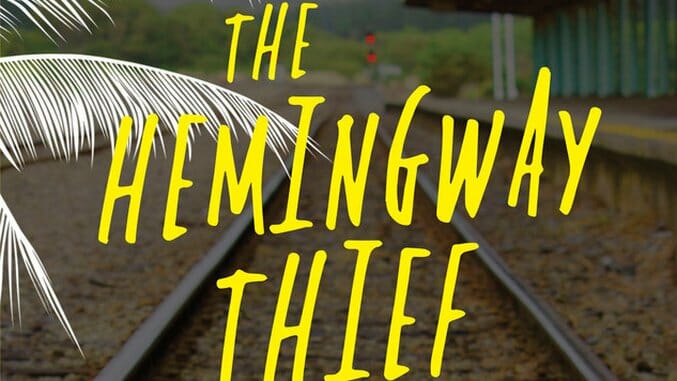Shaun Harris’ The Hemingway Thief Delivers a Literary Mystery with a High Body Count

Shaun Harris’ debut novel, The Hemingway Thief, contains the typical ingredients of compelling crime fiction: Mexican drug cartels, down-and-out Yanqui hotheads, merciless thugs and gun-slinging bounty hunters. But it’s originality stems from combining these elements with a stolen Ernest Hemingway manuscript—an early draft of A Moveable Feast. The manuscript boasts a lost chapter that could lead to the infamous suitcase stolen from Hemingway’s wife on a train in 1922. The bag’s contents? Hemingway’s unpublished short stories.
Hemingway fans and scholars have obsessed over the lost material for decades, and Harris isn’t the first writer to build a book around the suitcase incident (science fiction writer Joe Haldeman did so in his parallel-worlds novella The Hemingway Hoax in 1991). But The Hemingway Thief expropriates the incident differently, fashioning itself into the kind of literary thriller mélange crafted by Harris’ Seventh Street Books imprint-mate Gordon McAlpine in Hammett Unwritten.
 Harris’ book rewards crime novel fans with more brutality and less metafictional sleight-of-hand than McAlpine’s novel, along with comic blustering and an undisciplined onslaught of gratuitous pop culture references. A tasteful editor likely would have cut most of these references, but someone at Seventh Street must have recognized them as true to the narrator’s artless storytelling persona and wisely left them intact.
Harris’ book rewards crime novel fans with more brutality and less metafictional sleight-of-hand than McAlpine’s novel, along with comic blustering and an undisciplined onslaught of gratuitous pop culture references. A tasteful editor likely would have cut most of these references, but someone at Seventh Street must have recognized them as true to the narrator’s artless storytelling persona and wisely left them intact.
We meet narrator Henry “Coop” Cooper at a derelict Baja hotel bar, where the American novelist has exiled himself to plot the murder/suicide of his literary nom de plume, Toulouse Velour. Much to his ongoing embarrassment, Coop (as Velour) has written 32 profitable pulp romance novels featuring a Scottish vampire detective. He’s produced a body of “chick lit” so convincing and popular with women that virtually everyone assumes the author is a woman. Coop is more than a little defensive about it, snapping with equal ferocity at episodes of gender misidentification and any mention of John Grisham. As the official author of a single, long-forgotten literary novel published under his own name, which garnered dismal reviews and worse sales, Coop, by his own admission, is “dead to the publishing world.”
-

-

-

-

-

-

-

-

-

-

-

-

-

-

-

-

-

-

-

-

-

-

-

-

-

-

-

-

-

-

-

-

-

-

-

-

-

-

-

-








































